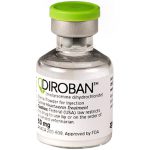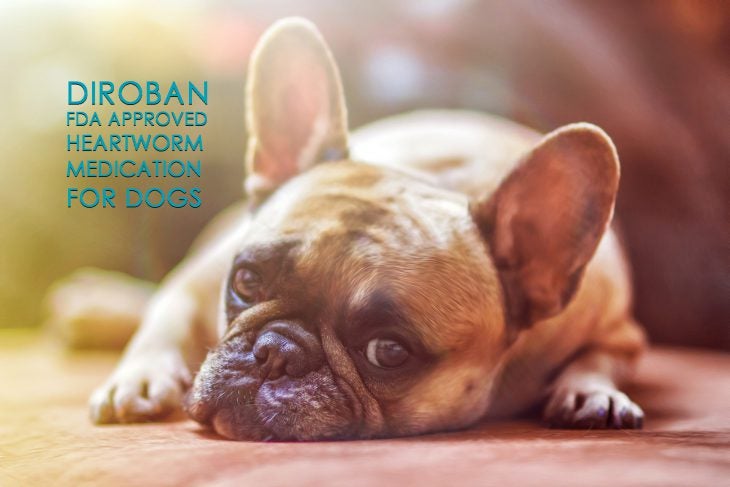There is great news in the fight against heartworms in dogs. Diroban (melarsomine dihydrochloride) has been approved as “the first generic drug to treat heartworm disease in dogs”* by the U.S. Food and Drug Administration (FDA).
Why is the approval of Diroban so important?
For the last six years, there has been a steady decline in the production of Immiticide (melarsomine dihydrochloride), which is used to treat heartworm infections, in the United States. The decline has created a shortage of Immiticide. The shortage has been caused “due to technical difficulties faced by the U.S. supplier of the drug.”** Due to the shortage, veterinarians have had to limit prescribing this vital medication. By the FDA approving Diroban as a generic drug in the treatment of heartworm in dogs, pet parents will now be able to get the protection their dog needs without worrying about there not being enough to go around.
 What is Diroban?
What is Diroban?
Diroban 25 mg/ml sterile powder for injection is indicated for the treatment of stabilized Class 1a, 2b, and 3c heartworm disease caused by immature (4 month-old, stage L5) to mature adult infections of Dirofilaria immitis in dogs.
How does the Diroban work?
Melarsomine dihydrochloride (the active ingredient in Diroban) is an organic arsenical chemotherapeutic agent. Melarsomine has a molecular weight of 501.34 and is chemically designated as 4 – [(4, 6-diamino-1, 3, 5- triazon-2-yl) amino] phenyldithioarsenite of di (2-aminoethyl), dihydrochloride. It is freely soluble in water. When injected intramuscularly, it is rapidly absorbed. The exact mode of action on D. immitis is unknown.
Does Diroban for dogs require a prescription?
Yes! Diroban does require a prescription from a licensed veterinarian.
What side effects can a dog experience while taking Diroban?
ADVERSE REACTIONS (SIDE EFFECTS): Injection Sites: the recommended dosage in clinical field trials, significant irritation was observed at the intramuscular injection sites, accompanied by pain, swelling, tenderness, and reluctance to move. Approximately 30% of treated dogs experienced some kind of reaction at the injection site(s). Though injection site reactions were generally mild to moderate in severity and recovery occurred in 1 week to 1 month, severe reactions did occur (< 1.0%), so care should be taken to avoid superficial or subcutaneous injection and leakage. Firm nodules can persist indefinitely.
Other Reactions: Coughing/gagging, depression/lethargy, anorexia/in appetence, fever, lung congestion, and vomiting were the most common reactions observed in dogs treated with melarsomine dihydrochloride. Hyper salivation and panting occurred rarely in clinical trials (1.9% and 1.6%, respectively); however, these signs may occur within 30 minutes of injection and may be severe. One dog vomited after each injection of melarsomine dihydrochloride, despite pretreatment with anti-emetics. All adverse reactions resolved with time or treatment with the exception of a limited number of injection site reactions (persistent nodules).
CONTRAINDICATIONS: DIROBAN is contraindicated in dogs with very severe (Class 4) heartworm disease. Patients in this category have Caval Syndrome (D. immitis present in the venae cavae and right atrium).
About heartworms in dogs
When a mosquito, carrying the heartworm larvae, bites a dog the larvae enter the dog’s bloodstream by way of the open wound left by the bite. Once inside, the larvae use the dog’s bloodstream to work their way in the dog’s heart and lungs where they take up residence. The larvae take up to 6 months to mature. Once matured, heartworms can live inside the dog’s body anywhere from 5 to 7 years. During this time, heartworms, which have been known to grow up one foot in length, can greatly affect your dog’s health.
How do to tell if your dog is suffering from heartworms:
According to the American Heartworm Society, “Signs of heartworm disease may include a mild persistent cough, reluctance to exercise, fatigue after moderate activity, decreased appetite, and weight loss. As heartworm disease progresses, pets may develop heart failure and the appearance of a swollen belly due to excess fluid in the abdomen. Dogs with large numbers of heartworms can develop a sudden blockages of blood flow within the heart leading to a life-threatening form of cardiovascular collapse. This is called Caval Syndrome, and is marked by a sudden onset of labored breathing, pale gums, and dark bloody or coffee-colored urine.”***
What is the best way to prevent heartworm in dogs?
There is no foolproof way to avoid a dog from getting heartworms. However, a preventative treatment program can greatly reduce a dog’s chances of getting heartworms. The best method is to have the dog diagnosed for heartworms annually. If the dog does have heartworms, the administration of heartworm medication on a monthly basis is highly recommended.
*“FDA Approves Diroban, the First Generic Drug to Treat Heartworm Disease in Dogs” U.S. Food and Drug Administration. 17 February 2017. Web. https://www.fda.gov/AnimalVeterinary/NewsEvents/CVMUpdates/ucm542091.htm Retrieved on April 20, 2017.
** “FDA Addresses Continued Shortage of Drug Used to Treat Heartworm Infection in Dogs” U.S. Food and Drug Administration. 3 December 2013. Web. www.fda.gov/AnimalVeterinary/NewsEvents/CVMUpdates/ucm377386.htm Retrieved on April 20, 2017.
***“Heartworm Basics” American Heartworm Society. 2017. Web. https://www.heartwormsociety.org/pet-owner-resources/heartworm-basics Retrieved on April 20, 2017





